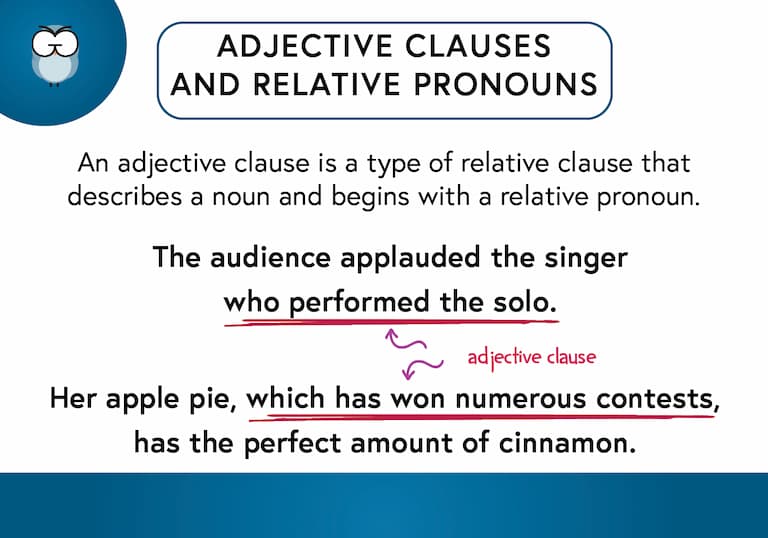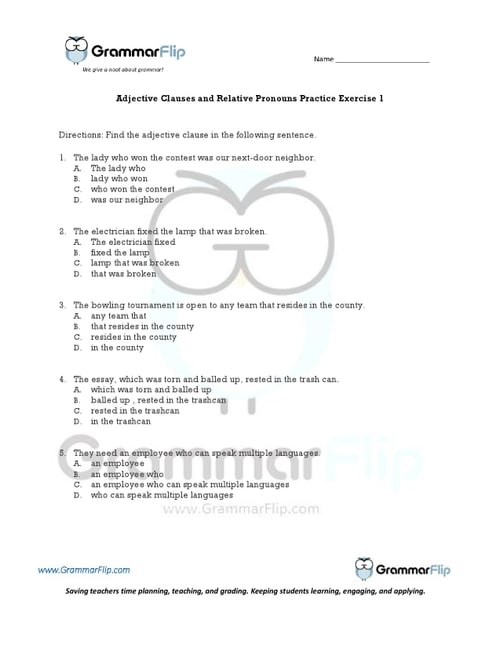What is an Adjective Clause?
An adjective clause is a type of relative clause that describes a noun and begins with a relative pronoun (who, whom, whose, that, which, what).
Some examples of adjective clauses would be the following:
The audience applauded the singer who performed the breathtaking solo.
My mother’s apple pie recipe, which has won numerous contests, has the perfect amount of cinnamon and nutmeg.
Darius, whose paintings are all over the art classroom, wants to study design in college.
Our new team captain will be Sylvia, whom I have played soccer with since childhood.
I had to try on the jacket that was on the mannequin.
Long-Form Videos: Adjective Clauses
Long-form instructional video lessons allow students to engage with grammar concepts in more depth and detail.
This format provides students with a stronger foundation and a more comprehensive understanding of adjective clauses.
Short-Form Videos: Adjective Clauses
Short-form videos are an excellent way to review grammar concepts. Our two-minute instructional videos help students review the concept of adjective clauses to further solidify their understanding.
Definition Cards: Adjective Clauses

Definition cards reinforce grammar concepts by providing clear and concise explanations that students can easily reference for quick review and better retention. GrammarFlip’s definintion cards help students review the concept of adjective clauses to further solidify their understanding.
Why You Should Use Adjective Clauses in Your Writing
Keep in mind that adjective clauses are simply dependent clauses that begin with a relative pronoun, and as a whole, they function like an adjective which means they will describe a noun.
The benefits of using adjective clauses in your writing is primarily to provide more description or detail about the noun in the main clause of the sentence. Notice the difference between the following two sentences:
I smiled at the baby.
I smiled at the baby who seemed very sad.
Without the adjective clause, there would be a good bit of detail and context left out of the sentence, so be sure to use adjective clauses where appropriate in your writing to provide more detail and description.
Be sure you have a solid understanding of independent clauses and dependent clauses as well, and when you’re ready, explore noun clauses, adverb clauses, and elliptical clauses, too!
Download a Free Worksheet on Adjective Clauses!
Click the image below to download your free worksheet on adjective clauses!

Need a grammar program that provides the instruction and grading for you?
Explore More GrammarFlip Lessons!
Parts of Speech lessons provide the building blocks of grammar. GrammarFlip covers these topics in detail to ensure a solid foundation is built. First time learners and students seeking to review the parts of speech can both benefit from the instructional videos and slide show reviews.
Parts of the Sentence lessons are critical for understanding how the parts of speech function in language construction. From the basic to the advanced, these lessons will cover a wide range of grammar topics that can be used in any grade level or classroom.
Mechanics and Usage lessons equip students with the necessary skills to communicate clearly to all audiences. With a focus on the application of these concepts in student writing, these lessons tie together both simple constructions of grammar as well as the more complex such that any age or skill level of student will benefit.


